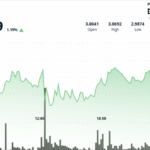The release of newly revised jobs data by the U.S. Department of Labor has fueled a fresh wave of criticism from the White House, targeting key figures such as former President Joe Biden, Federal Reserve Chair Jerome Powell, and the Bureau of Labor Statistics (BLS). This unprecedented downward revision, the largest on record, has prompted White House Press Secretary Karoline Leavitt to assert that President Donald Trump’s previous concerns about the economy under Biden have been validated.
In a statement following the release of the data, Leavitt described the revision as evidence of a “disastrous” economic situation under Biden and labeled the BLS as “broken.” She emphasized the importance of restoring trust in the BLS’s data, which financial markets, businesses, lawmakers, and families depend on for crucial economic decisions.
According to the Labor Department’s report, released on a Tuesday, the U.S. economy created significantly fewer jobs during the year starting in March 2024 than previously reported. The annual revision revealed a reduction of 911,000 jobs from earlier estimates, intensifying scrutiny on the BLS’s accuracy.
The BLS has been under particular scrutiny, facing a concerted attack from the Trump administration aimed at undermining confidence in its data findings. In a notable incident, Trump dismissed BLS Commissioner Erika McEntarfer shortly after the bureau published initial employment figures for July, which included downward revisions for previous months. This action drew significant backlash from economists and various lawmakers, who criticized the move as an attempt to politicize employment data.
Additionally, Fed Chair Jerome Powell, who was nominated by Trump in 2017, has found himself in the crosshairs of the White House’s criticisms. As Trump’s frustrations have mounted over Powell’s reluctance to cut interest rates, the president has increasingly targeted the central bank’s leadership. In August, Powell indicated that uncertainty surrounding the U.S. economy might justify interest rate cuts in the near future. This hint of possible rate adjustments comes amidst ongoing economic challenges heightened by the revised job data and persistent inflation concerns.
The intersection of these narratives illustrates the complex and often contentious relationship between economic policy, data management, and political posturing in the current administration, as both sides brace for a continuing battle over the U.S. economic narrative.







